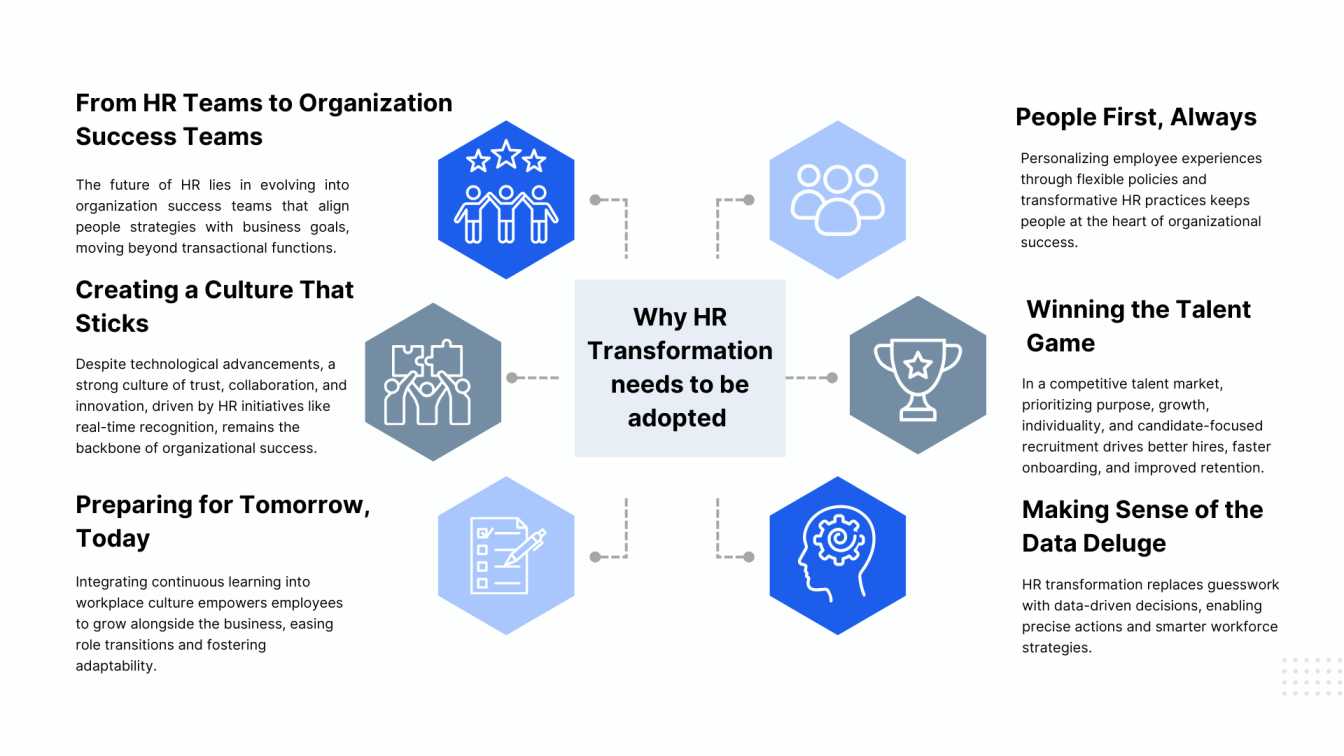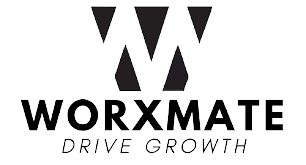- Product
Product Overview
Deep AI
Define, execute, evaluate and plan your OKR journey
OKR Solution
Discover focus, alignment and celebrate success
Performance Management System
Manage, Evaluate, and Increase Employee Performance
Task Management
Prioritize, plan, and deliver tasks effectively
Join leading organizations relying on Worxmate for efficient OKR management and success
Personas
CHRO
Optimize HR functions with our AI-driven performance management
CEO
Explore strategic leadership insights and best practices for CEOs
Strategy Head
Drive strategic excellence that fuels innovation & success
Product Head / CPO
Empower product leadership with goal alignment
Marketing Head
Empower Your Marketing Teams to Drive Growth, ROI, and Brand Impact
Sales Head
Maximize sales performance by data-driven decision making
L&D Head
Empower L&D Teams to drive growth and employee success
- OKR Consulting
- Pricing
- About Us
- Resources
- Contact Us
- Articles
Why HR Transformation is Vital in the Digital Workplace?
- December 19, 2024
- 5 min read

Overview
As someone who has spent about 17 years in HR, I’ve witnessed first-hand how quickly the world of work can change. Over the past few years, though, the pace of change has been unprecedented.
Hybrid and remote work have redefined the workplace, and technology has become the backbone of how we connect, collaborate, and thrive. Amid all this, one thing has become crystal clear: HR transformation is not just a fad; it’s essential for organizations to stay relevant and competitive in the digital era.
Let me break it down through my own experiences and observations.
When I started my career in HR, things were simpler—processes were manual, interactions were in-person, and decisions were often made based on intuition and experience. Today, the workplace looks nothing like it did back then.
Employees expect seamless digital experiences, leaders demand data-driven insights, and agility is the name of the game. Adapting to this new reality means HR can’t operate like it did 10 or even 5 years ago.
I’ve seen organizations struggle when their HR functions couldn’t keep pace with these changes. On the flip side, I’ve also seen the incredible transformations that happen when HR takes the lead in reimagining how people and technology come together.
Why HR Transformation Needs to be Adopted ?

1. People First, Always
Even as technology drives the future, people will always remain at the heart of any organization. One of the biggest shifts I’ve seen is the need to personalize employee experience—whether it’s creating flexible work policies (something implemented in my own organization) or leveraging tools that make day-to-day tasks easier. For example, when we introduced hybrid working, employees reported higher satisfaction and productivity, as they were enabled to balance personal and professional commitments more effectively. Transformation in HR ensures that we don’t lose sight of what truly matters aka. our people.
2. Winning the Talent Game
The talent market today is fierce. Candidates expect more than just competitive pay; they want purpose, growth opportunities, and a workplace that respects their individuality. Transforming recruitment processes to embrace automation and focus on candidate experience can result in multiple wins i.e. better hires, faster onboarding, and higher retention.
3. Making Sense of the Data Deluge
I’ll admit—early in my career, HR decisions were mostly gut-based. That doesn’t cut it anymore. With the right tools, we can now analyze trends, predict workforce needs, and make smarter decisions. For instance, when working on an employee satisfaction survey recently, the data was to pinpoint areas for improvement and take targeted actions. HR transformation equips us with this kind of clarity and saves on time taken in the ‘guessing game’.
4. Preparing for Tomorrow, Today
Reskilling and upskilling are no longer optional. I’ve seen the anxiety employees feel when their roles evolve, and they’re unsure if they can keep up. By integrating continuous learning into our workplace culture, we’ve helped our people grow alongside the business. This, to me, is one of the most rewarding aspects of HR transformation.
5. Creating a Culture That Sticks
No matter how advanced your tech stack is, your culture is what binds your organization together. In my role, I’ve emphasized creating a culture of trust, collaboration, and innovation—and HR is at the centre of driving this. For instance, at Parkar we implemented a rewards and recognition program that celebrates individual and team achievements in real time. This not only boosts morale but also strengthens collaboration across departments. Transformation ensures that culture remains a constant, even as everything else evolves.
6. From HR Teams to Organization Success Teams
One of the most exciting shifts I see in the future of HR is that companies won’t just build HR teams anymore—they will build organization success teams. This means shifting the focus from transactional HR functions to a broader role that aligns people strategies with business goals.
For example, in a recent project, we collaborated with the leadership team to revamp performance management. Instead of focusing solely on individual KPIs, we looked at team collaboration, innovation, and long-term value creation. The result? Higher engagement and a more aligned workforce that directly impacted the organization’s success.
Organization success teams aren’t just about managing employees; they’re about enabling them to thrive and contribute meaningfully to individual goals, department goals as well as the business’s goals. It’s a holistic approach that prioritizes growth, resilience, and adaptability—qualities every organization needs to succeed in the digital age.
Starting Your Transformation Journey
HR transformation can seem daunting if one is stepping into it for the first time. If you’re wondering where to begin, my advice is simple: start small but think big AND .
- Look at processes that feel outdated or manual and ask, “How can we make this easier?”
- Engage with employees—understand their pain points and aspirations.
- Embrace technology that empowers, not overwhelms.
However, HR transformations should not be adopted simply because it’s trending and everyone else is doing it. If a company doesn’t have a serious need for transformation, the digital shift runs the risk of being a waste with limited to nil return on investment. Careful evaluation of the organization’s needs, readiness, and goals is critical before embarking on this journey.
HR transformation is not just about keeping up; it’s about leading the charge. For me, it’s been a journey of learning, adapting, and embracing change. And let me tell you, the results are worth it. When HR is empowered to transform, the entire organization benefits—employees feel valued, leaders have clarity, and businesses are ready to tackle whatever comes next.
If you’re an HR professional or a leader wondering if now is the time to start transforming your HR function, here’s my answer: absolutely. And if you’ve already started, keep going. The future of work is digital, but the heart of work will always be human.
Read More: Effective OKR Examples for HR Teams to Boost Employee Engagement and Productivity

Sr. Director- Human Resources at Parkar Digital
16+ years of experience in HR field of Talent Management, Talent Acquisition & Talent Development wherein, Zara has handled HR compliances and activities for multiple accounts across various verticals like Telecom, Banking & Finance, etc.
